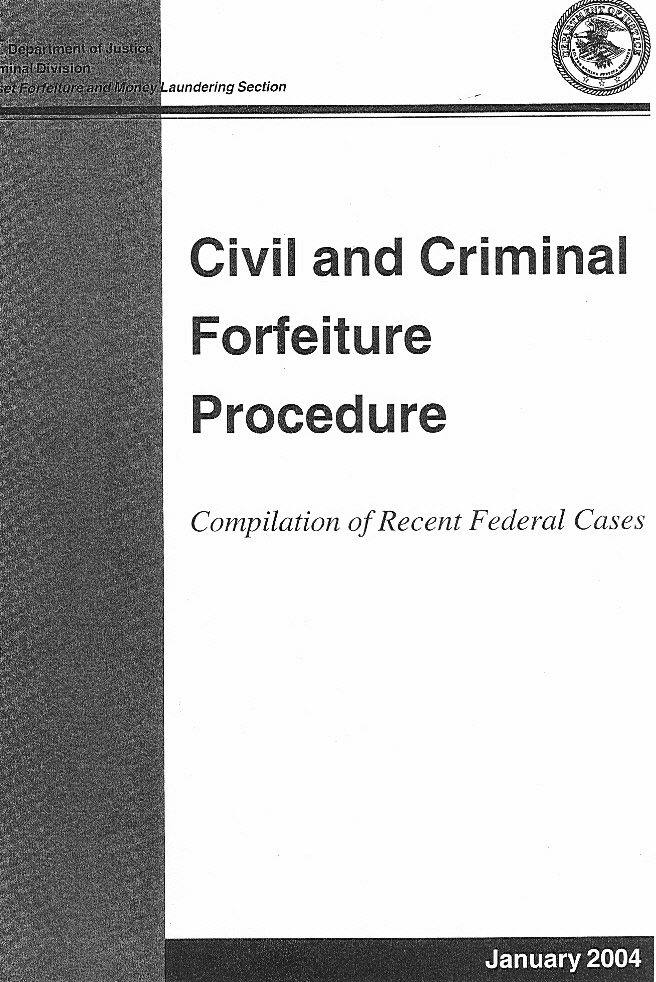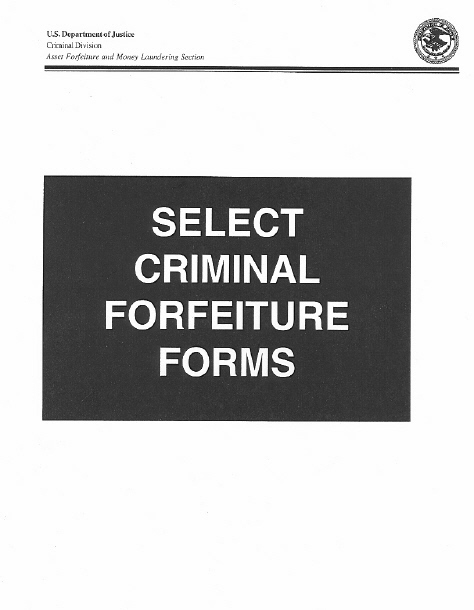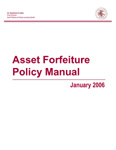

(1) read "What to Do When Your Property Has Been Seized", to get an overview of the forfeiture processes. (The information from that webpage is also available as a FEAR pamphlet which you can print out on-line in PDF form and give to your clients).
(2) if your case is being prosecuted as a state forfeiture, get the state statutes from FEAR's Law Library
(3) if your case is being prosecuted under federal law, look up the federal statute(s) in the FEAR Law Library
(4) buy FEAR's Asset Forfeiture Defense Manual - especially if your case is federal. You'll need it. It will pay for itself the first hour you use it. Even in state forfeiture cases, the manual provides valuable background information, constitutional principles and case law that is generally applicable to state cases. State procedures were usually modeled after the federal procedures, although state procedures now vary from state to state. If you need to expedite your order, call FEAR after placing your order and give us your Fed Ex account number and we'll overnight the book to you.
(5) subscribe to FEAR's online Brief Bank II & Private Collection. It only costs $100 a year, and the sample pleadings, motions, discovery requests and briefs are worth many thousands of dollars worth of your time - and may well prevent you from making a big mistake.Experienced forfeiture defense attorneys:
(6) purchase Forfeiture 101 - FEAR's Continuing Legal Education DVD course that enables defense attorneys to effectively expand their practices to meet the needs of the vastly increasing number of victims of the government's ever-broadening overreach for assets and money judgments. Lawyers taking on their first forfeiture case suddenly find that law school never prepared them for the maze of complex proceedings that strictly adhere to Supplemental Rules for Admiralty or Maritime Claims and Asset Forfeiture Actions, further complicated by CAFRA reforms that apply to some forfeiture proceedings and not to others. Forfeiture victims will find this DVD to be a godsend – especially those forced to represent themselves because they can't afford counsel.
(1) if you handle federal forfeiture cases, you should purchase FEAR's Asset Forfeiture Defense Manual. It puts all the law you need at your fingertips, in concise, well-organized fashion. You'll use it over and over as the first resource you turn to when researching any forfeiture issue. Only $119 plus shipping/handling. It's also useful in state cases for its explanation of constitutional defenses and principles, although it does not cover procedures and substantive law applicable to the different states.
(2) two DOJ publications we recommend for your desktop library are available for free in PDF format from the FEAR website. Print them out online at the following links:
(3) subscribe to FEAR's online Brief Bank II & Private Collection- a huge time saver whenever you need a new sample pleading, motion, etc. Then send us your best briefs, pleadings, motions and discovery requests to contribute to our collection. Currently we have over 160 motions, pleadings and briefs in Brief Bank II, with more being added all the time. A subscription membership to FEAR's Brief Bank also includes access to our Private Collection of documents, including several Department of Justice manuals on asset forfeiture law, statutes and policy.
(4) take advantage of FEAR's online Forfeiture Lawyer Directory. You can sign up by filling out this form.
(5) print out FEAR's tri-fold pamphlet "What to Do If Your Property Has Been Seized", make copies and keep them in your reception room for clients to read and take home, to answer their frequently asked questions.
(6) sign up for FEAR-List, a free email bulletin service for forfeiture news and updates on changes in forfeiture law.
(7) take advantage of the FEAR website as a research tool. The FEAR on-line Law Library has links to on-line state statutes and most of the federal statutes pertaining to forfeiture (we've updated our collection recently, but we're still not sure we've included all the criminal statutes incorporated by reference as forfeiture triggers in the past 4 years.) If you find a statute we haven't included, let us know.
Even veteran forfeiture defense lawyers need this book! It's big -- 500 pages in 8-1/2 X 11" format, in 11 point type, with 2,629 footnotes. Even though it was published in 2001, the law is still up to date. It's easy to use and comprehensive. And "it's readable!" said attorney Jody Neal-Post. Forfeiture victims trying to represent themselves pro se need this book – particularly inmates, who don't have access to adequate research tools.
To order the manual, buy it online from
this website using PayPal, or send a check or money order
for $119 plus $12 for postage/handling and sales tax, if
applicable to FEAR Manual, 20 Sunnyside, Suite A-419, Mill Valley,
CA 94941. (California residents
(that is, book orders sent to California addresses) must add
appropriate sales tax. Nonprofit organizations and government
agencies may avoid paying the sales tax by sending along a
photocopy of their state tax exemption notice.)
Profits from the sale of these publications help keep FEAR afloat -- so you're helping the cause while you help yourself!
*******************************************************************************| FEAR's
newly updated, expanded, revamped and greatly
improved Brief Bank II & Private Collection of Research Materials FEAR's newly expanded Brief Bank II now contains over 200 motions, pleadings and briefs, plus seven complete Department of Justice manuals on asset forfeiture statutes and policies. Try it once and you'll see, this is the first place to go when conducting forfeiture research. Those of you with Brief Bank subscriptions should take a look at Brief Bank II now. It's pretty awesome! Brief Bank II - now with over 200 motions & briefs - Brief Bank II - indexed by Issue ( includes over 90 different issues) - Brief Bank II - indexed by type of motion or pleading (now includes examples of 36 types of pleadings) - Brief Bank II - indexed by author - Brief Bank II - indexed by case name Private Collection - now with 26 documents, including seven US Department of Justice manuals* - Private Collection - indexed by Issue (now includes 184 different issues) - Private Collection - indexed by author - Private Collection - indexed by publication or article * The Private Collection now includes a complete hypertext version of seven DOJ forfeiture manuals:
If you are a current subscriber to Brief Bank you can access the new Brief Bank II using your regular user ID and password. If you are not a current subscriber, a one-year subscription costs $100, and can be purchased online on the FEAR website, using Paypal. Attorneys: Please send us your best briefs and motions as soon as possible, so that we can expand our collection. To donate motions or pleadings, e-mail them as attached files to Brenda Grantland. Motions, pleadings and briefs may be submitted in any word processing format. Please leave the caption and formatting intact (but if you want to keep your client's name out of it, use "search and replace" to change the client's name to a pseudonym or a blank. More about FEAR's "Private Collection" of Research Materials: The members-only section of the FEAR website contains scanned in versions of the two most important of the almost-banned DOJ publications, as well as some excerpts from FEAR's Asset Forfeiture Defense Manual. Here are the current contents  The
DOJ's
Civil and
Criminal Forfeiture Procedure
- 300+ pages [All parts available in PDF format; Parts
I
and III available in hypertext (web pages); rest is
coming soon] The
DOJ's
Civil and
Criminal Forfeiture Procedure
- 300+ pages [All parts available in PDF format; Parts
I
and III available in hypertext (web pages); rest is
coming soon]"...Of the five DOJ publications on forfeiture which the government ordered public libraries to destroy last summer (and then retracted its order because of our public outcry) , this almost-suppressed publication is the most important to forfeiture victims and defense lawyers. It contains the Justice Department's official position on the key legal issues the defense commonly encounters in civil and criminal forfeiture cases, and is updated with the changes made by CAFRA (the Civil Asset Forfeiture Reform Act of 2000). "This DOJ publication is a good way to start your research..."  The DOJ's Select
Criminal
Forfeiture Forms -
[26 page introduction available in hypertext and PDF
format] The DOJ's Select
Criminal
Forfeiture Forms -
[26 page introduction available in hypertext and PDF
format]"This almost-banned Department of Justice publication contains some statements about criminal forfeiture procedure which could be very useful to forfeiture victims. I used a quote from the introduction, "Criminal Forfeiture Procedure," to great effect in countering a prosecutor's argument that certain provisions of civil forfeiture law did not apply to a seizure of some airplanes because (he said) they were seized with a criminal forfeiture warrant.... "...nothing I could cite would have had the impact of quoting the Department of Justice's own manuals on the subject."  ** The DOJ's Asset
Forfeiture Policy Manual,
published in January 2006, is a treasure trove
of information. ** The DOJ's Asset
Forfeiture Policy Manual,
published in January 2006, is a treasure trove
of information.
Forfeiture-savvy
journalists
will
have
a field day with this! Defense lawyers
will love it too.
Although the U.S. Supreme Court held in United States v. Caceres, 440 U.S. 741 (1979) that the government's "official policies" are not enforceable in court in suits brought by private parties, the government's policies are valuable to defense lawyers and pro se litigants, enabling them to make intelligent decisions in settlement discussions and other matters. Also, when the forfeiture prosecutor takes an unreasonable stance in court or in negotiations, it certainly helps to quote the official policy manuals of the DOJ! Index to FEAR's Asset Forfeiture Defense Manual - Available here only -- not in the published volume! Purchasers of the Manual should print this out and keep it with the manual for ready reference. Appendix 1: CAFRA digested by key word- this alphabetized digest of civil and criminal forfeiture procedure is so useful we decided to make it available on-line in our Private Collection. This hypertext version is even better than the hard copy, because it links to the text of the applicable statutes. Excerpt from Chapter 00 Part A: "Forfeiture Litigation After CAFRA"- this portion of the first chapter of FEAR's manual explains how the Civil Asset Forfeiture Reform Act of 2000 changed asset forfeiture law and procedure, and why we feel the reform bill did not go far enough to restore Due Process and curb government abuses. FEAR's Asset Forfeiture
Defense Manual is available
for
purchase on this website.
(500 pages in 8-1/2" X 11" format; $119 plus tax and
shipping charges) California and D.C. residents (that is, book
orders sent to California or D.C. addresses) must add
appropriate sales tax. Nonprofit organizations and
government agencies may avoid paying the sales tax by
sending along a photocopy of their state tax exemption
notice .
FEAR's On-Line Forfeiture Lawyer Directory Forfeiture lawyers can have their credentials, and even a photo, posted in FEAR's website Lawyer Directory for $100 per year. Just fill out the Attorney Application on line, and send your photograph (optional) to F.E.A.R., 20 Sunnyside Suite A-419, Mill Valley, CA 94941. You can also send your digital photo as an email attachment by e-mailing Brenda. Note: we only accept attorneys who have prior experience handling forfeiture cases. The FEAR on-line Law Library provides links to on-line state statutes and most of the federal statutes pertaining to forfeiture (we've updated our collection recently, but we're still not sure we've included all the criminal statutes incorporated by reference as forfeiture triggers in the past 4 years.) If you find a statute we haven't included, let us know. FEAR-List is an e-mail list covering forfeiture issues, including news articles, court decisions, reports on pending legislation, victim stories, requests for help, and new announcements about FEAR. The list is moderated, so there's no chat. It's free. You can sign up below. (There is also a link in the main menu of the FEAR website.) Indexed archive of 2007 FEAR-List Bulletins with full texts from linked articles here. We are making these articles available for educational purposes only, so please respect copyrighted material.
Other resources: The official annual reports for
the federal Forfeiture Funds are online. For the Department of
Justice's fund see DOJ's
website
Reports to Congress. The Treasury
Department's reports are online at http://www.treas.gov/offices/enforcement/teoaf/annual-reports.shtml
.
The U. S. Attorneys' Manual , complete with a search function, is online. The area of most interest to us is Section 9-111, "FORFEITURE/SEIZURE". |